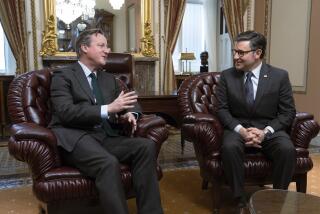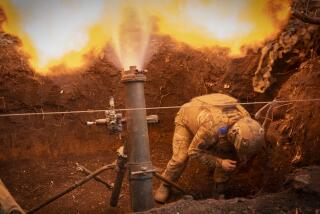Q&A: Michael Fallon, the British defense secretary, talks terrorism and Trump

Michael Fallon, Britain’s defense secretary, talks about the potential effects of a Donald Trump presidency on NATO and Russia.
Britain has long been the United States’ closest and most important ally. At the Reagan National Defense Forum — a gathering last weekend of hundreds of defense industry executives and government officials at the Ronald Reagan Presidential Library in Simi Valley — its defense secretary, Michael Fallon, sat down with The Times to discuss terrorism and other threats to the world order as U.S. President-elect Donald Trump prepares to take office and Britain prepares to leave the European Union. Spoiler: He was optimistic.
With Islamic State losing ground in Iraq and Syria, do you have any fears it is moving south into Jordan or shifting operations to other places such as Libya? How are you dealing with that?
We are making huge progress in Iraq [against Islamic State]. They control now less than 10% of the territory of Iraq and only one major city. And that city is now encircled. Iraqi forces are getting into the suburbs of eastern Mosul, and I hope that city eventually will fall. And the lines of communication have been cut between Mosul in Iraq and Raqqah in Syria. And therefore those remaining fighters in Mosul will have to decide whether to surrender or whether to be defeated. We’re keeping a very close eye on where they may likely disperse to, either down to the Euphrates River valley … or elsewhere.
How big of a concern are Islamic State fighters returning to the U.K.? What are you doing to monitor people coming back?
They’re a concern for everybody…. Some who have may have been responsible for the most heinous of crimes, we may want to see tried for those crimes through the international criminal system. Other countries will want to deal with their own returning fighters. For ourselves, we think we have 200 to 300 who may wish to return. If they’ve been fighting for [Islamic State], then they have been committing a criminal offense for which they can be prosecuted.
What influence will ‘Brexit’ have on coordination of efforts to stop terrorist attacks in Europe?
We remain a leading member of NATO. We remain committed to our key partnerships and alliances, particularly with the United States. And we we remain a key contributor to the fight against [Islamic State] in the Middle East. Brexit has no effect, no impact, on that.
How has intelligence sharing changed since the terrorist attacks in Paris (November 2015) and Brussels (March 2016)?
There’s more data sharing, intelligence sharing, cooperation on counter-terrorism among the European countries. There was always a certain amount before. But that isn’t dependent on membership in the European Union.
Let’s talk about Donald Trump. He’s expressed the desire for warmer relations with Russia, a strong ally of Syria. What does that mean for the future of Syria and Syrian President Bashar Assad?
There’s always been a relationship between the United States and Russia. It’s not surprising that a new incoming president will want to reset it. It’s important to talk to Russia about reducing tensions, de-escalating tensions where Russia has been aggressive. It’s also important to talk to Russia about areas of the world where Russia has great influence. Over Iraq, for example, but also over Syria. Any further pressure that can be brought to bear on Russia, to bear in turn on the Assad regime, can only be welcome.
Do you see Assad staying in power?
We don’t see a future for Syria with Assad remaining. This is a man who has barrel-bombed his own citizens and has plunged Syria into the most appalling civil war that’s destroyed a large part of the country and killed hundreds of thousands and displaced millions.
How do you bring Russia over to that position?
We continue to convene discussions among those moderate opposition groups to Assad, those that are prepared to play a part in a democratic Syria. We continue to try and persuade Russia that that is, in the long term, the only future for Syria. Syria had elections before. There is no reason why Syria should not have elections again.
Trump has criticized NATO members for not paying their way and suggested that the United States could renege on certain commitments to the alliance. What are your feelings about the strength of NATO with the new administration coming in?
He’s not the first new American president to call on Europe to shoulder more of the burden. He’s right that still not enough European countries are meeting the 2% [under North Atlantic Treaty Organization guidelines, each member’s defense spending is supposed to be at least 2% of its gross domestic product]. Britain is meeting the 2% target. Obviously the U.S. meets it easily. We want to see other European countries meet that target…. We welcome what President-elect Trump has said and we look forward to working with him.
Do you feel confident that the U.S. will protect the Baltic states — Estonia, Latvia and Lithuania — given concerns about Russian expansionism?
The United States is one of the four countries of NATO that has stepped up to provide a full battalion to protect the Baltic states and Poland. We’ll have British troops alongside it — 150 British troops. We will be leading the battalion in Estonia. That enhanced presence by the United States, by the United Kingdom, by German and Canadian troops, I think, will help reassure those allies on the eastern flank that NATO is prepared to defend itself.
Looking ahead to the next administration here, you don’t see that changing?
That’s a commitment that the United States has given. I don’t see that changing.
Are you hearing concerns from other NATO members about the umbrella of American military power under Trump? What are people saying about this incoming administration?
When you get a change of administration, when you get a change from Democrat to Republican, these questions are often there…. I don’t think there’s serious concern as to how a Trump presidency will work out. I think in Europe we’re well used to dealing with campaign rhetoric on the one hand and what an administration does in practice on the other.
On the campaign trail, Trump said that he is going to be less likely to get involved in foreign entanglements. Can the U.S. both disengage and defeat Islamic State at the same time?
Again, I think you need to aim off the campaign rhetoric. I think it was Mario Cuomo who said you campaign in poetry and you govern in prose. I’m not going to accuse Donald Trump of poetry. I don’t think that accusation will stick. What’s important is to see what the administration does in practice. And in practice every administration has accepted that leadership role of dealing with international terrorism.
The Obama administration has expressed a commitment to drawing down troops in Afghanistan and Iraq. What kind of commitments do you want to see from the U.S. going forward?
The United States did review its posture in Afghanistan, and we were one of those countries that urged the U.S. to keep its troop numbers up. Because we’ve all spent a lot of blood and treasure in Afghanistan. It remains very fragile…. There are transnational terror groups operating in Afghanistan that threaten all our security. If the country collapses, there’s migration, which again threatens us in the West. And let’s not forget, Afghanistan is a democracy — 6 or 7 million people voted in Afghanistan. It’s a democracy that has asked for our help. So I’m sure the United States will stay the course in Afghanistan. And we certainly will. We’re increasing our contribution by around 10%. We’ll be going up from 450 to around 500 troops.
Follow me on Twitter @alanzarembo
More to Read
Start your day right
Sign up for Essential California for news, features and recommendations from the L.A. Times and beyond in your inbox six days a week.
You may occasionally receive promotional content from the Los Angeles Times.







